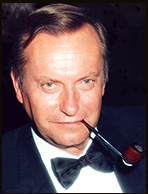William Wesley Eckenfelder Jr., deemed the ‘godfather’ of industrial wastewater management by many of his colleagues, former students and peers, died March 28 in Nashville. He was 83.
A memorial service will be held April 1 at the Marshall Donnelly Combs Funeral Home from 2-4 p.m.
 Eckenfelder |
Eckenfelder was known internationally as a pioneer in the field of water treatment and a leading authority in industrial wastewater management. In addition to founding several companies, he was an environmental engineering professor at Manhattan College, the University of Texas-Austin, and Vanderbilt University.
He came to Vanderbilt University in 1969 and retired as Distinguished Professor of Environment and Water Resources Engineering, Emeritus in 1989.
His primary research interest at retirement was advanced activated sludge technology. At his death, Eckenfelder was a technical director at AquAeTer, a Nashville-based engineering firm that focuses on projects related to energy, engineering, environmental, sustainability, and risk analyses.
In 2008 he was an integral part of a three-day wastewater treatment workshop – Advanced Biological Wastewater Treatment Technologies: Innovative Solutions to Difficult Problems – offered by the Vanderbilt School of Engineering and Siemens Water Technologies Corporation.
Eckenfelder was a prolific writer and he influenced countless numbers of engineers through his many textbooks, hundreds of journal articles, and courses. Among Eckenfelder’s more than 30 technical books, his second book, Industrial Water Pollution Control published by McGraw-Hill, is a classic text initially intended for the classroom. The most recent fourth edition is marketed and used by practicing professionals in the field.
Many students have said Eckenfelder instilled a sense of confidence in them and his door was always open to all. “As Wes Eckenfelder’s first Ph.D. student, and one whose life was professionally influenced by such a friend, mentor and icon, I am forever grateful that he came my way,” said Davis L. Ford, past president, American Academy of Environmental Engineers.
In a 2008 interview published in Industrial WaterWorld, Eckenfelder said over the span of his career he was most proud of being one of the primary developers of biological treatment technology. His first book, Biological Wastewater Treatment, was published in 1960. In the 1950s he designed his first activated sludge plant, which was a model for a pulp and paper plant, and for a pharmaceutical plant.
In October 2009, a memoir was released – Wwe: The life of an environmental pioneer – and a book signing reception was held at the School of Engineering. The following month, Eckenfelder spoke at the 2009 American Institute of Chemical Engineers (AIChE) annual meeting in Nashville. His presentation was entitled “60 Years of Biological Wastewater Treatment.”
Eckenfelder was the founding principal of several companies, including AWARE, Inc. in Nashville, Tenn., which was later named Eckenfelder, Inc. in his honor. AWARE merged in 1998 with Brown and Caldwell, a California-based full-service environmental engineering firm. In recognition of Eckenfelder’s many contributions to the profession of environmental engineering, Brown and Caldwell established the Dr. W. Wesley Eckenfelder Scholarship.
He received 28 awards and accolades from professional societies. In December 1999, he was named one of three people named “20th Century Pollution Control Pioneers” by Environmental Protection magazine. The other two were Rachael Carson, author of Silent Spring, the 1962 book widely credited with helping launch the environmental movement in the United States, and British Nobel Laureate and biochemist Archer J. P. Martin who developed the method of gas-liquid chromatography.
One of the last awards he received was created in his honor by the Water Environment Federation. He received in 2007 the inaugural Dr. Wesley Eckenfelder Industrial Water Quality Lifetime Achievement Award at the revived Industrial Water Quality Conference in Providence, R.I.
Eckenfelder was born in New York City in 1926 and graduated from high school at age 16. He received bachelor’s degree in civil engineering from Manhattan College in 1946. He earned a master’s degree in sanitary engineering from Pennsylvania State University in 1948, and a master’s degree in civil engineering from New York University in 1954. He also pursued post-graduate studies at North Carolina State University and Penn State.
Eckenfelder was preceded in death by his son, Lawrence. He is survived by his wife, Agnes Elliott Eckenfelder; his daughter, Janice Lariviere; his daughter-in-law, Dora Eckenfelder; and five grandchildren.